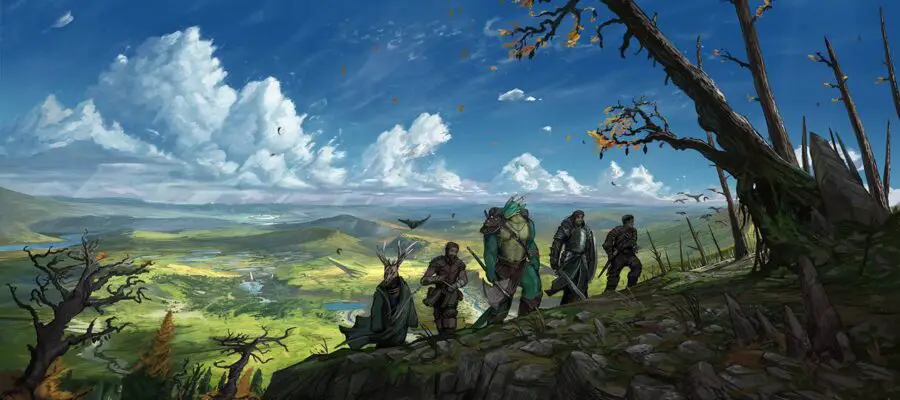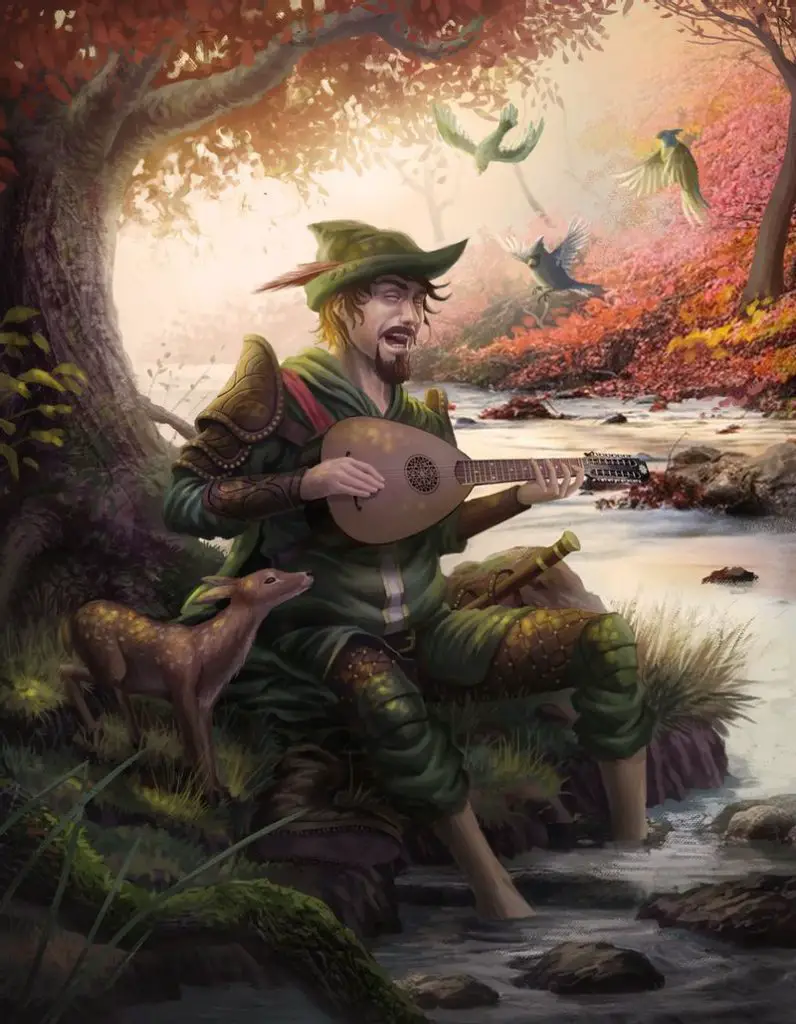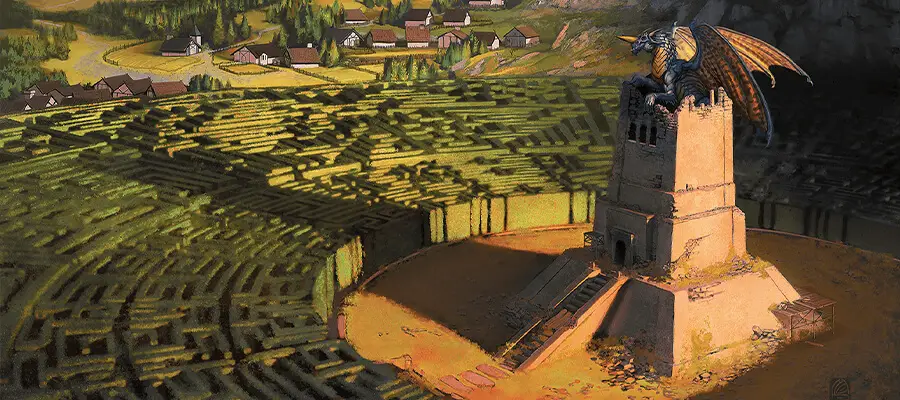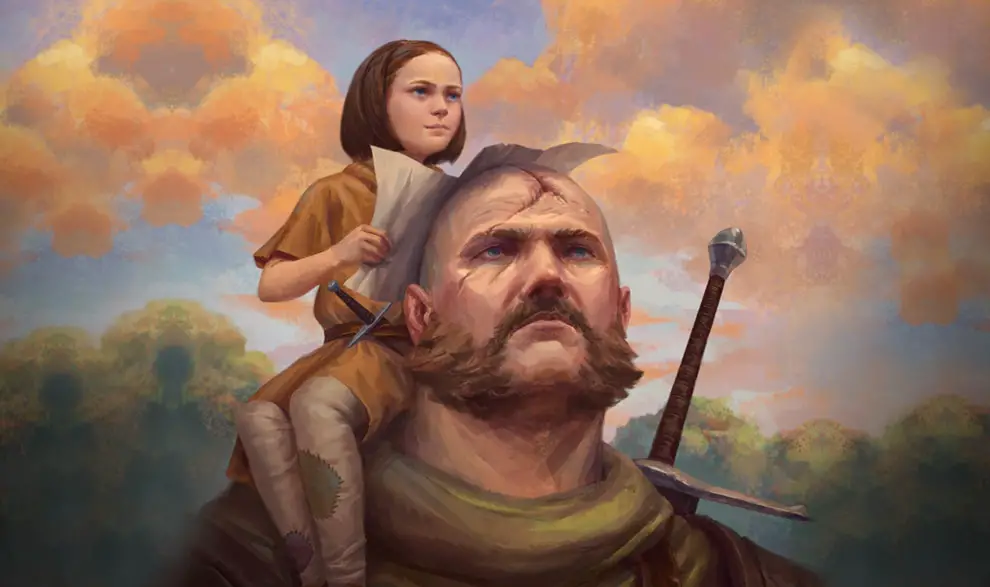“The winding path” by ThemeFinland. Creative Commons Attribution-Noncommercial-Share Alike 3.0 License
Picture this…
It’s your first session of a grand campaign. You’re the DM, and you want to start the campaign with a bang to keep players interested in the story for months to come. To enable your first session to become a smashing success, I’ve compiled a list of my best ideas for breaking the mold on campaign starters. I guarantee you’ll find several ideas that spark inspiration for your upcoming campaign. You might even find ideas that you can use mid-campaign to stage the next phase of the story. Here are my top ideas for campaign starting scenarios.
Captured
Examples include the beginning of The Elder Scrolls V: Skyrim and the D&D module Out of the Abyss. Prison can give a DM time to establish story elements until an escape opportunity presents itself to the players. The theme of the campaign can be introduced, and one or more villains and other prominent NPC’s can be encountered. Players tend to care more about the story and its villains if they encounter them along the way. A bonus to this approach is that the players won’t be running off to do their own thing as they would in the classic tavern starting point.
Buried
This one was used on me for a one-shot. We had amnesia of recent events after waking up buried alive. The DM had us use methods to get out, but it was awkward that all of my attempt rolls failed. Luckily, one of the other characters was my character’s brother, so he searched for me to save me from death. Without a character relationship there, nobody would’ve known to look for me because our characters were mostly strangers to start off. For this reason, it can be awkward for the group to see the DM feel uncomfortable with the unexpected chance of player death before anything actually happens, haha! It was fun to come out of the ground without any equipment though, so we had to fight several undead creatures with rocks. It really upped the danger level
Public Execution
The players notice a crowd gathering for some kind of public beheading, hanging, or burning of several outlaws. Each of the players knows of someone from their character backstory that is among the lineup to be executed. Players know that this is a false execution of innocents, perhaps because of a government police force like the Gestapo in Nazi Germany. This reminds me of the movie Jojo Rabbit, which I love. The situation calls for a moral dilemma for the characters as they’ll immediately want to rescue their friends from death. You could stage this problem in a way that is immediate as the executions are about to begin, or you could announce the deaths to come while giving players time to work out a plan. For the latter, the crowd could be given time to throw rotten food at the prisoners as a kind of propaganda hour that the government allows, getting the people to socially buy into the public execution’s premise of justice. There is also a plot line in the Octopath Traveler game like this that involves liberating a city. There are many directions you can go from here, including the party becoming revolutionists within the city or fleeing to the wilderness to avoid capture.
Cutting a Deal
Open up in a den of thieves. The players are speaking to the head of a black market organization to secure the bail of their friend that wrong the organization in some way. Reasons might include debtors imprisoning their friend, but it could also be that the party’s friend was caught stealing. This will allow for roleplaying immediately, but it gets spicier when the organization is attacked from a mysterious rival guild. The party will have a chance to prove themselves in combat to stop several assassins that have bypassed the combat going on in the early rooms of the thieves’ den. If the party manages to save the guild leader, they’ll be granted their friend’s freedom. It’s up to you if the den is overrun and the party must flee, or if the situation is brought under control to allow the players to further interact with the organization. Make sure to give the crime boss a parrot or some other quirky pet.
Shipwrecked
Skip the ship sinking and skip straight to the party washing ashore on a strange island. They’ll eventually have a goal to find a way off the island, but until then, allow them to encounter mysteries that need solving on the island. They can locate supplies from the ship that also wash up, and perhaps encounter NPC survivors. The ship’s sinkage was due to a rival ship, perhaps captained by aggressive merchants, and that rival ship may have survived or mutually sank. Either way, there may be hostile NPC’s that wash up as well. This can set up an excellent opportunity for a geographically small, concentrated campaign setting (at least at first). Flutes Loot has articles devoted seafaring D&D and class builds to further inspire you for this shipwrecked humble beginning.
Roc’s Nest Hatchlings
Your players have been picked up by a Roc (bigger than some dragons). Now plopped in the nest, the players are left alone to be food for the Roc hatchlings that are currently shaking from their eggs. The Roc leaves them alone in an assumption that they’ll die (at low levels, they could). Party members will have time to figure out a plan to escape, but it’s gonna be tough. If they stay to fight, the Roc may return to murder them. They also might die to the formidable hatchlings. I recommend allowing them to find some flying devices that past Roc meals have left behind, especially if there is an Artificer in the party. They could also attempt to climb down from the nest, but it’s located in high, sheer cliffs. I don’t recommend this for new players unless you really want to hold their hand to find a solution. This should involve creativity, which new players don’t always take initiative to try.
Resurrected
This one is owed to Reddit user u/critical_courtney (thank you for allowing me to use your idea). Your characters are all evil, but they’re dead. This story begins when the characters are resurrected by a necromancer or other powerful being with influence over death. They’ve been raised to accomplish a grand task. The nature of this quest is up to you, but the players will love creating a backstory that involves the circumstances of their deaths.
Arena
Your players’ characters have been accused of crimes that got them sent to the colosseum to fight for their lives. They can easily be strangers in this scenario as they’re forced to work together. You can set up interesting social encounters and problem solving between arena fights. Afterwards, the players will each have their own personal backstory plot hooks to pursue based on the crimes they did or did not commit prior to being thrown into the arena. They’ll likely have enemies to overcome as well once they’re free. Enjoy this sandbox style of D&D where the party can have diverse goals and side quests.
Enslaved
If you’re not adverse to using slavery in your campaign, you can try starting the group off in some form of slavery. They can be slaves that are owned by powerful political figures in a national government that sacked the players’ home country (I hear it was common to take slaves back in the day when nations were defeated at war). This is similar to some of my other suggestions, so I won’t rehash some of those suggestions too much. Slavery is a strong way to set up recurring villains for later, Django Unchained style.
Royal Dinner
Party time! Your characters are attending a royal party, or some otherwise high-profile shindig. Players might be brought together as one of the players makes a noble-background character that is exiled during the dinner by her father because she lacks the wisdom to be the king and queen’s successor. She and her loyal subjects must set out to do good in the land that she may learn her way in the world. The other party members can be her subjects, veterans of the kingdom that come out of retirement to help the girl for some reason, or some reformed criminal earning his freedom. Keep in mind that not all players will enjoy giving the spotlight so much to a single player character. I just think some groups are mature enough to use this concept and run with it. There are many examples in storytelling where there is a clear main character surrounded by other strong characters, including The Lord of the Rings, Harry Potter, and Avatar: The Last Airbender. Don’t skip too quickly past the initial royal party though; you can have a lot of fun here setting up recurring NPC’s, PC flaws and bonds, or campaign story themes.
Public Hearing
*Law and Order theme song* It’s time for a judge and jury situation. Your PC’s could be on trial, or they could be attending a trial of their ally. They could even be strangers on a jury. Regardless of their involvement and the trial’s result (by your discretion), the case should result in a strong call-to-action for your characters collectively. For tips on how to set up story elements for characters based on this beginning, read our article about tips from famous storywriters.
Caravan Ambush
This is especially useful for short campaigns, but can be used for any campaign to start. Hired by merchants to guard their caravan, the players must deal with an ambush. This can go several ways. First, the caravan is overrun and its goods are stolen. Players will survive if they surrender, and they can seek vengeance later if they wish (or if they’re paid enough). They’ll discover that among the items stolen is a powerful artifact that kings would pay top dollar for. The rest is up to the players. Second option is that the players successfully protect the caravan but there’s something off about the creatures that attacked. While the caravan stops to repair the wagons, players can investigate deep in the woods for an answer to the strange behavior of the aggressive creatures from before. This investigation should reveal a dangerous influence, person, or other plot device that is driving creatures mad in the environment. The third option is for the players to win the fight at the ambush, but they discover that their employer has lost an item of great importance. It was stolen from the caravan during the distraction ambush. Your players might figure out that another merchant in the caravan took advantage of the commotion to steal the item. You could also set it up so the attacking creatures had a sneaky member of their group get behind to steal the item during the attack.
Natural Disaster
The wrath of the gods comes in many forms: flood, earthquake, tornado, drought, tsunami, fire, sinkhole, plague, insect/beast infestation, and more. You can begin your campaign with your characters dealing with a town’s disaster. The town could be a small or large town they’re passing through, or it can be a hometown. Saving people and property during a disaster can make the players stand out as heroes, which can get the attention of benefactors and noblemen that have jobs for hire. There could also be an uncovering of a call to adventure that a natural disaster reveals: a flood could wash up an artifact that nations would kill for, a tornado could unearth a dungeon lost to time, and an beast infestation could be caused by a greater threat that is laying down roots deep in a thick forest. Whatever options you choose, your players will be involved in the plot in an active way right off the bat.
Courier
Your party becomes glorified delivery boys. They need to deliver a sealed chest or letter to an important noble. One way this can go is for them to be attacked on the road, but the attack seems calculated rather than a random bandit attack. This leads the party to believe they’re carrying something valuable. After completing the delivery, there could be a tragic event that reveals the importance of the item they delivered, and there could be a call to adventure built into it. You could alternatively have the players decide to peek into the item they’re delivering, even though they were told they’d forfeit pay if they did so. The rest is up to you.
Invading Army
This one is especially cool if your players all decide on solidarity in their background; in this case, they can all choose the Soldier background. They’re invading a foreign nation, but they are experiencing doubts that they’re on the righteous side of the war, or at least doubting that the war is warranted. Maybe they scout ahead and find evidence in the letter of a runner that they intercept. The letter describes the confusion of the targeted nation that they’re being invaded. This campaign’s first session should end with the players taking up a call to adventure that is so strong that they would desert their army, or the army itself gives the players a task that will eventually lead to them moving on to their own goals. You could make this a dark, tragic beginning if you mimic the Ishvalan Civil War from the Fullmetal Alchemist: Brotherhood series which involved a corrupt government ordering otherwise decent men and women of the military to exterminate an entire city, culture, and religion of its own population. Don’t spare the tragic details of how the conflict went from tense to violent due to an outsider posing as an officer to commit an abominable murder against innocents.
Refugee March
This one is the flipside of the Invading Army suggestion I provided. Following a terrible battle, your PC’s are part of a massive march of refugees making its way to a nearby city or nation to seek refuge. Their home has been sacked by a powerful entity or army that will feed into the campaign’s main quest. What is that quest? I leave it to you, but it could be a classic tale of characters that have been driven from their home as a call to adventure. Make sure this campaign is straight forward, meaning the bad guys are well known and established. The tricky part will be creating a grand reveal that will change the way the players perceive the whole situation. It could be that the invading army had declared that they were taking back land, but the true reason known only to its leaders could be that they’re seeking an ancient temple where kings of old buried their powerful artifacts. If the players can eventually find this out, and stop the enemy leaders from obtaining these artifacts, those players will redeem their home while thwarting power-hungry tyrants.
The Ancient One
I used this idea in my campaign that revolved around ancient talismans that represent the universe’s concept of order. This is a trope of a campaign starter because it relies on the story element of the wise mentor or ancient one that sets the main characters apart as champions of an important cause or quest. My example involved the players in the right place at the right time to stop several groups from escaping with ancient artifacts from a hidden monastery, but you can set it up in any way you want. Just remember to give your players agency and power as a result of this quest, and make sure the ancient one or ancient group has a reason to rely on the players. An easy reason would be that the ancient group actually dies in the campaign’s starting session, ending the session with the players setting out past the point of no return. This is a great idea for newer players who don’t have their own backstories that can drive the story; let the ancient quest drive the action.
Conclusion
Feeling inspired? Don’t forget to bookmark this page so you can review it later. Write down your new ideas so you can remember them when the time is right; after all, the palest ink is better than the best memory. Comments are excellent ways to write down your ideas, so please comment with your favorite ideas from my list. Don’t neglect to share your best ideas for campaign starters.
For additional help on story inspiration, check out these other articles from Flutes Loot:




